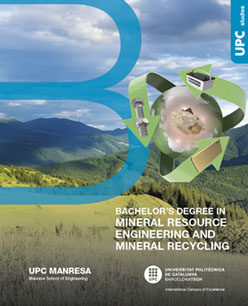Bachelor's degree in Mineral Resource Engineering and Mineral Recycling

Bachelor's degree in Mineral Resource Engineering and Mineral Recycling
Manresa School of Engineering (EPSEM)
By taking the bachelor’s degree in Mineral Resource Engineering and Mineral Recycling, you will acquire the competencies needed for professional practice as a technical mining engineer, particularly skills related to sustainability and the circular economy. The knowledge you will acquire will allow you to practise in a wide range of fields, such as the use of natural resources, civil works, applied geology, spatial planning and environmental management.
- Duration
- 4 years
- Study load
- 240 ECTS credits (including the bachelor's thesis). One credit is equivalent to a study load of 25-30 hours.
- Delivery
- Face-to-face
- Language of instruction
Check the language of instruction for each subject (and timetable) in the course guide in the curriculum.
Information on language use in the classroom and students’ language rights.
- Fees and grants
- Approximate fees per academic year: €1,107 (€2,553 for non-EU residents). Consult the public fees system based on income (grants and payment options).
- Location
- Manresa School of Engineering (EPSEM)
- Places
- 180
- Registration and enrolment
- What are the requirements to enrol in a bachelor's degree course?
- Legalisation of foreign documents
- All documents issued in non-EU countries must be legalised and bear the corresponding apostille.
First semester
Second semester
Third semester
Fourth semester
Fifth semester
Sixth semester
Seventh semester
- Business English 6
- Construction Materials and Their Recycling 6
- Downholes and Horizontal/Directional Drilling 6
- Energy Resources 6
- Environmental Impact and Restoration 6
- Glass and Ceramic Industry 6
- Hidrogeology 6
- Maintenance Management 6
- New Mining Techniques 6
- Occupational Risks Prevention 6
- Potash Mining 6
- Project Management 6
- Quality Management and Integrated Quality, Safety and Environmental Management Systems 6
- Thermal and Mineral Waters 6
- Underground Mining 6
Eighth semester
- Bachelor's Thesis 18
- CompulsoryECTS
- OptionalECTS
- ProjectECTS
- Professional opportunities
- Supervision of underground and open-cast mining activities. Management of work teams and machinery.
- Management of land restoration.
- Supervision in waste treatment plants.
- Supervision in aggregate treatment plants and cement, concrete and ornamental and industrial rock manufacturing plants.
- Groundwater management
- Blast design in mines and civil works.
- Quality control and characterisation tests of pyrotechnic materials
- Supervision in public and private works (roads, dams, buildings).
- Management of environmental impact studies.
- Management of work teams in surveying and preparation of surface and underground surveys.
- Writing and analysis of geotechnical reports.
- Technical work in spatial planning and management.
- Technical work in occupational safety.
- Technical work in organisation and quality control.
- Technical work in areas of public administration related to the profession.
- Teaching at secondary schools and universities.
- Research for R&D projects.
- Academic calendar
- General academic calendar for bachelor’s, master’s and doctoral degrees courses
- Academic regulations
- Academic regulations for bachelor’s degree courses at the UPC
- Language certification and credit recognition
- Queries about language courses and certification
- 20/04/2024 10:00 hface-to-face
- 11/05/2024 10:00 hface-to-face
- 12/06/2024 19:00 hvirtual
Download brochure

Open day
Bachelor's degree in Mineral Resource Engineering and Mineral Recycling
- Day
- 20/04/2024
- Time
- 10:00 h
- Location
- Escola Politècnica Superior d'Enginyeria de Manresa (EPSEM)
- Av. de les Bases de Manresa, 61, 73, 08242
- Manresa
- More information
- Face-to-face information session. Registration is required. Further information
Open day
Bachelor's degree in Mineral Resource Engineering and Mineral Recycling
- Day
- 11/05/2024
- Time
- 10:00 h
- Location
- Escola Politècnica Superior d'Enginyeria de Manresa (EPSEM)
- Av. de les Bases de Manresa, 61, 73, 08242
- Manresa
- More information
- Face-to-face information session. Registration is required. Further information
Open day
Bachelor's degree in Mineral Resource Engineering and Mineral Recycling
- Day
- 12/06/2024
- Time
- 19:00 h
- More information
- Virtual information session. Registration is required. Further information
